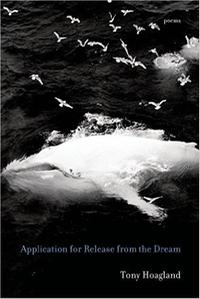
|
|
| photo: Ann Staveley | |
Tony Hoagland's fifth and newest collection of poems, Application for Release from the Dream, was published by Graywolf Press on September 1, 2015. His most recent collection of essays about poetry is Twenty Poems That Could Save America and Other Essays, also from Graywolf. Hoagland teaches at the University of Houston.
On your nightstand now: Winter Pollen, essays by Ted Hughes. Hughes has a masterful poetic intelligence, erudite, rational and also radically intuitive; like D.H. Lawrence, he belongs to the hairy shamanic camp of the Brits. Thrown, a memoir of cage fighters by Kerry Howley--what an entertaining piece of anthropology; Survival in Auschwitz by Primo Levi; Gun Street Girl by Adrian McKinty. I don't read poetry before bedtime: it's over-stimulating, and can easily murder sleep. Oddly enough, murder mysteries rarely murder sleep.
Favorite book when you were a child: Rudyard Kipling's Just So Stories. Kipling has such an amazing musical ear, and a deep sense of storytelling as ceremony and myth. I also read a hundred collections of folk and fairy tales: Persian fairy tales, Indian fairy tales, Greek fairy tales--anything. It was very much of a narcotic for me--I have no clue of any influence those big anthologies had on me. I just wanted to go away.
Your top five (or six) authors:
One reason that this question is difficult to answer is psychological: there are many writers who were life's blood to me at certain points of my life, that I since have unconsciously repressed. That kind of repression often necessarily follows that kind of deep involvement (for the sake of one's autonomy). The process is somewhat violent and unconscious--a former strong influence is sometimes like a parasitic relative you would cross the street to avoid. I'd deny that I knew them, as Peter did Jesus--though not three times, I hope. That said, these remain: Frank O'Hara, W.H. Auden, W.S. Merwin, Louise Glück, Yehuda Amichai, George Bernard Shaw.
Book you've faked reading:
W.G. Sebald's The Rings of Saturn. Not faked--just that I haven't really clicked on what Sebald does literarily. With some writers, you just keep returning until they let you in.
 Books you're an evangelist for:
Books you're an evangelist for:
Saul Bellow's Henderson the Rain King; Wallace Shawn's The Fever; The Descent of Alette by Alice Notley; and The End of the Novel of Love by Vivian Gornick. When I look at this list, I can see that all these texts braid together two recurrent strands of my interests--keen political insight and a rather Jungian understanding of the psyche. We human beings are immersed up to the neck in selves we can't see; we are perpetual mysteries to ourselves. Ironically, that invisibility is part of our functional intelligence, and often part of our power to act in inspired ways. I have always mistrusted people who truly believe that they know what they're doing. That is what makes politicians and capitalists such a shrieking nightmare.
Books that changed your life:
This may be a little embarrassing. Flowers for Algernon by Daniel Keyes; A Separate Peace by John Knowles; Be Here Now by Ram Dass; The New American Poetry, edited by Donald Allen; and "Travels in Georgia," the famous essay by John McPhee. Some of these for spell-binding and some for spell-breaking.
Favorite line from a book:
From the opening of the Grace Paley short story "The Story Hearer": "I am trying to curb my cultivated individualism, which seemed to me for years so sweet."
Here's another: "So I remember all those whose death/ is necessary condition of the season's putting forth," from "Easter" by Auden.
Then there is Ted Berrigan's memorable line in the poem "Frank O'Hara": "Grandmother divided by monkey equals outer space."
Books you most want to read again for the first time:
Raise High the Roof Beam, Carpenters and Seymour: An Introduction by J.D. Salinger; John Steinbeck's Cannery Row et al.; the early short stories of Ann Beattie, which I was over the moon about; Don Delillo's White Noise; and many others.

